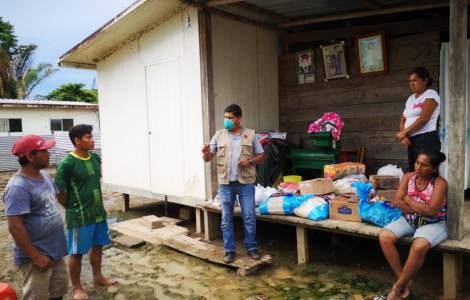
Caritas
Loreto (Agenzia Fides) - The National Coordination of Human Rights of Indigenous Peoples, in the face of the global health emergency, have asked the Peruvian government for precise and targeted directives regarding the communities of the Peruvian forest. According to the note sent to Fides, this is a request for appropriate strategies and actions to safeguard the integrity and rights of indigenous peoples. Among the 15 members of the Coordination there are also the institutions of the Catholic Church, such as Caritas, the Commissions of the social pastoral care of the Apostolic Vicariates and the Commissions of social action which collaborate with the Peruvian Episcopal Conference.
It is therefore not only a question of requests for economic aid since the country has put a stop to trade in foodstuffs that reach these areas which are difficult to access, but above all of health protection, prevention and rescue, following the particular localization of the communities in the forest.
For example, the health check of the people who arrive in these communities is asked, because, as the testimonies sent to Fides by the missionaries who work here point out, infected merchants or government delegates can arrive, who can transmit the virus to a community. Not having health centers to accommodate a patient of this kind, it could cause a real tragedy, exterminating the whole community.
Instinctively the Manserian communities rejected food parcels for fear of contracting Covid-19.
The indegenous of the native communities of Yurapaga and Apaga, in the district of Manseriche, in the province of Datem del Marañón, Loreto in Peru, have decided not to receive the parcels with basic foodstuffs, delivered by the municipality of the district, for fear that the parcels contain the Covid-19 virus.
The news was communicated by the mayor of the district, Claudio Wampuch Bitap, who reported that the families of the area in question, have always refused to receive them, because they think that the virus may be in the wrappers of the products, as the products are brought from the coast. Faced with the refusal, the decision to deliver the food to families stranded in other parts of Peru, who could not reach their places of origin because of the quarantine was taken. (CE) (Agenzia Fides, 22/4/2020)